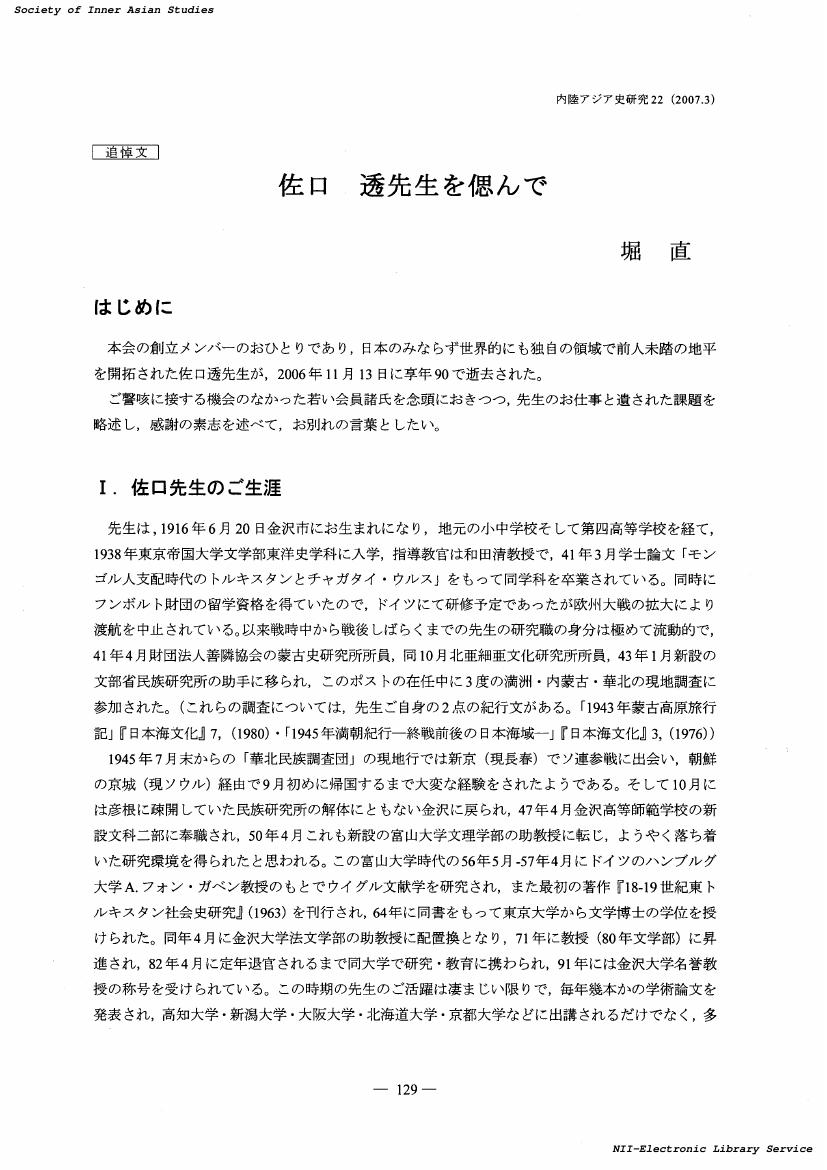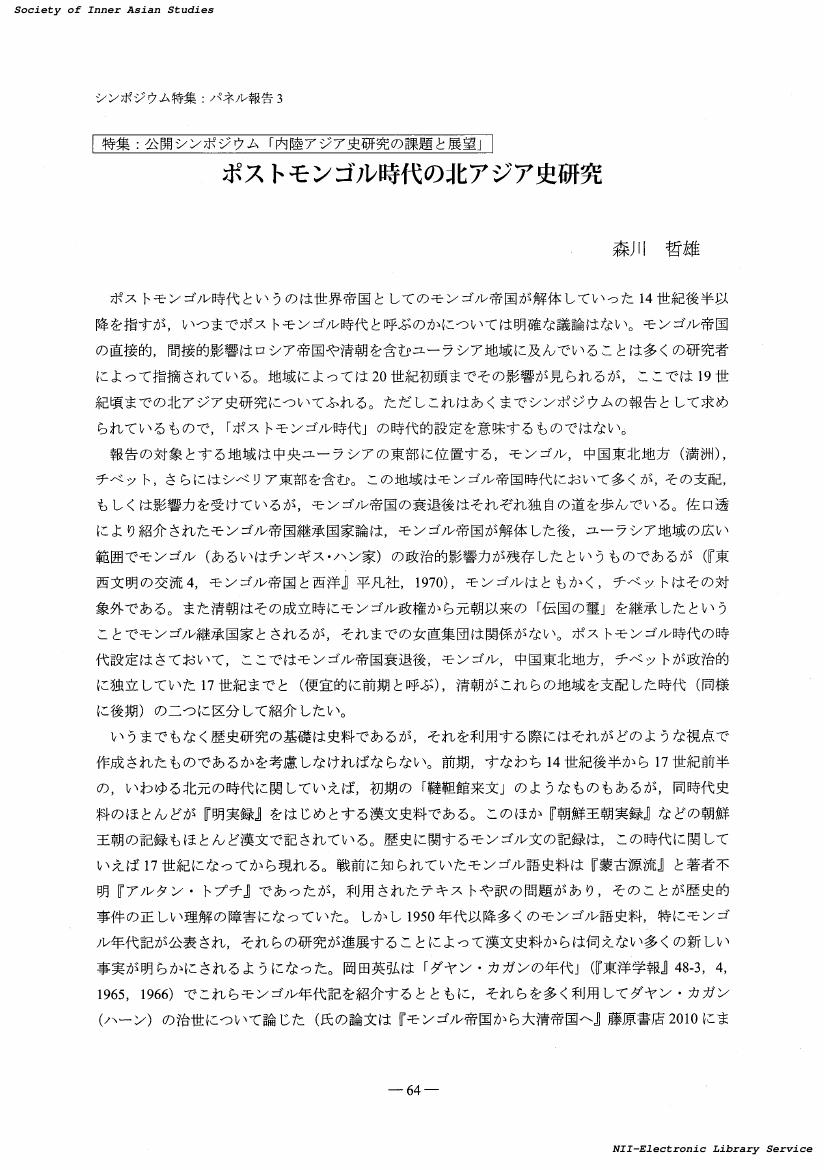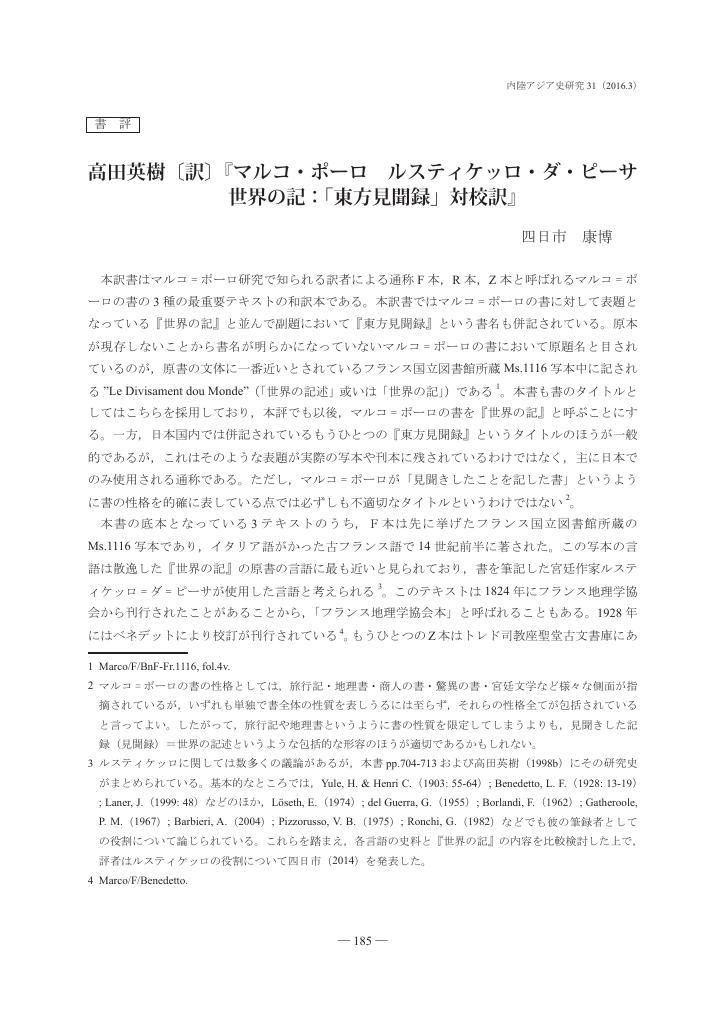105 0 0 0 OA モンゴル人の農耕
- 著者
- 吉田 順一
- 出版者
- Society of Inner Asian Studies
- 雑誌
- 内陸アジア史研究 (ISSN:09118993)
- 巻号頁・発行日
- vol.31, pp.1-26, 2016-03-31 (Released:2017-05-26)
This paper presents a study on crop farming agriculture of the Mongol nomads in the Mongolian highlands. The paper essentially concludes that both the nomadic Mongols of Eastern Inner Mongolia and the Khalkha Mongol nomads, who widely inhabit the central and northern parts of the Mongolian highlands, have been sharing a number of common features since the Mongol Empire, demonstrating particularly strong connection to millet – such as prefixing the Mongolian word for "millet" with the predicate "Mongol", referring to "millet" with the single word "Mongol", and predominantly cultivating millet. They also use the same cultivation method that does not interfere with their nomadic lifestyle and consists in sowing seeds after the rainy season in early summer just before leaving for summer pastures (with no irrigation or random irrigation) and harvesting on their return from the pastures before autumn frosts set in (in Eastern Inner Mongolia this traditional type of farming is called "namuγ tariy-a"). This method differs from the one adopted in the Western Mongolian highlands inhabited mostly by Oirat nomads who learned crop farming from the Bukharans and mainly cultivate cereals with substantial irrigation.
18 0 0 0 OA ジョチ・ウルス史再考
- 著者
- 川口 琢司 長峰 博之
- 出版者
- 内陸アジア史学会
- 雑誌
- 内陸アジア史研究 (ISSN:09118993)
- 巻号頁・発行日
- vol.28, pp.27-51, 2013-03-31 (Released:2017-10-10)
The aim of this paper is to attempt to reconstruct an overview of the history of Ulus-i Juci by elucidating several issues in the historical research of Ulus-i Juci, placing importance on historical sources written within the regime. (1) The other names of 'Ulus-i Juci' are examined. The paper suggests that 'Qipchaq Khanate' is the research appellation based on outside sources, as well as the possibility that the appellation of 'Golden Horde' goes back earlier than the 15^<th> century. (2) The 'two-winged' regime of Ulus-i Juci is investigated. The study demonstrates that Ulus-i Juci had been divided into right and left wings by the time, at least, of Toqta and this bipolar structure continued even after the unification of both wings by Toqtamis, something historians in the Timurid Empire also clearly recognized. (3) The appellations of 'White Horde' and 'Blue Horde' are investigated. From consideration of the issues regarding the first appearance of 'White Horde' in Russian historical sources and its implications, the study concludes that, at least by the late 14^<th> century, it was recognized that 'White Horde' referred to the right wing of the Ulus or the whole Ulus-i Juci, while 'Blue Horde' referred to the left wing of the Ulus. (4) The Riza' al-Din manuscript of Cingiz-nama, which was written by Otamis Haji, a historian in the Khiva Khanate, is investigated. The study demonstrates that this is a historical source of great value that narrates the history of Ulus-i Juci from the inside.
- 著者
- 橘 誠
- 出版者
- 内陸アジア史学会
- 雑誌
- 内陸アジア史研究 (ISSN:09118993)
- 巻号頁・発行日
- vol.29, pp.151-152, 2014
9 0 0 0 OA 佐口透先生を偲んで
- 著者
- 堀 直
- 出版者
- 内陸アジア史学会
- 雑誌
- 内陸アジア史研究 (ISSN:09118993)
- 巻号頁・発行日
- vol.22, pp.129-134, 2007-03-31 (Released:2017-10-10)
8 0 0 0 OA ティムール朝期の「一日行程」と駅伝制
- 著者
- 早川 尚志
- 出版者
- 内陸アジア史学会
- 雑誌
- 内陸アジア史研究 = Inner Asian studies (ISSN:09118993)
- 巻号頁・発行日
- vol.30, pp.23-49, 2015-03
As is usually the case with Inner Asian dynasties that ruled vast territories, the Timurid Dynasty operated a postal system, which encompassed an extensive web of postal stations. This system was instrumental in allowing the Timurids to acquire information rapidly, and it also facilitated the movement of both military personnel and civilians. The system was also used for time-tracking: For instance, citing how many postal stations there were between two cities proved to be a relatively reliable way of calculating distance. This truly demonstrates the importance of the postal system under the Timurid Dynasty, especially as far as transport is concerned. In this paper, I examine the postal station as a criterion of time-tracking and relate it to a unit called farsaḫ or farsang. I also discuss the way in which the Timurid Dynasty could retain and manage the postal station as a constant criterion. Specifically, I examine the system of postal stations, the permission needed in order to conduct a journey, how such permission was acquired, who could supply such permission, the benefits of such permission, and the support of the šiqāʾūls. The results of my investigation demonstrate how the Timurid rulers kept this web of postal stations in their lands and how they used them in order to obtain valuable information as quickly as possible, especially during emergencies.
- 著者
- 森川 哲雄
- 出版者
- 内陸アジア史学会
- 雑誌
- 内陸アジア史研究 (ISSN:09118993)
- 巻号頁・発行日
- vol.26, pp.64-68, 2011-03-31 (Released:2017-10-10)
7 0 0 0 OA ジョチ・ウルス史再考
- 著者
- 川口 琢司 長峰 博之
- 出版者
- 内陸アジア史学会
- 雑誌
- 内陸アジア史研究 (ISSN:09118993)
- 巻号頁・発行日
- no.28, pp.27-51, 2013-03-31
The aim of this paper is to attempt to reconstruct an overview of the history of Ulus-i Juci by elucidating several issues in the historical research of Ulus-i Juci, placing importance on historical sources written within the regime. (1) The other names of 'Ulus-i Juci' are examined. The paper suggests that 'Qipchaq Khanate' is the research appellation based on outside sources, as well as the possibility that the appellation of 'Golden Horde' goes back earlier than the 15^<th> century. (2) The 'two-winged' regime of Ulus-i Juci is investigated. The study demonstrates that Ulus-i Juci had been divided into right and left wings by the time, at least, of Toqta and this bipolar structure continued even after the unification of both wings by Toqtamis, something historians in the Timurid Empire also clearly recognized. (3) The appellations of 'White Horde' and 'Blue Horde' are investigated. From consideration of the issues regarding the first appearance of 'White Horde' in Russian historical sources and its implications, the study concludes that, at least by the late 14^<th> century, it was recognized that 'White Horde' referred to the right wing of the Ulus or the whole Ulus-i Juci, while 'Blue Horde' referred to the left wing of the Ulus. (4) The Riza' al-Din manuscript of Cingiz-nama, which was written by Otamis Haji, a historian in the Khiva Khanate, is investigated. The study demonstrates that this is a historical source of great value that narrates the history of Ulus-i Juci from the inside.
- 著者
- 四日市 康博
- 出版者
- 内陸アジア史学会
- 雑誌
- 内陸アジア史研究 (ISSN:09118993)
- 巻号頁・発行日
- vol.31, pp.185-196, 2016-03-31 (Released:2017-05-26)
6 0 0 0 OA 新刊紹介
- 出版者
- 内陸アジア史学会
- 雑誌
- 内陸アジア史研究 (ISSN:09118993)
- 巻号頁・発行日
- vol.31, pp.197-223, 2016-03-31 (Released:2017-05-26)
- 著者
- 森安 孝夫
- 出版者
- 内陸アジア史学会
- 雑誌
- 内陸アジア史研究 (ISSN:09118993)
- 巻号頁・発行日
- vol.26, pp.3-34, 2011-03-31 (Released:2017-10-10)
5 0 0 0 OA マンネルヘイムのアジア旅行関連資料とそれに基づくチベット仏教徒の動向について
- 著者
- 石濱 裕美子
- 出版者
- 内陸アジア史学会
- 雑誌
- 内陸アジア史研究 (ISSN:09118993)
- 巻号頁・発行日
- vol.31, pp.145-163, 2016-03-31 (Released:2017-05-26)
Carl Gustaf Mannerheim (1867-1951) travelled across Asia from Bukhara to Beijing from 1907 to 1908 to collect military intelligence for Russia. The diary he kept during this journey provides much information about Tibetan Buddhists under the influence of the Qing dynasty, namely Kalmuk, Torgut, Sirayogur, and Tangut, and contains a report of interviews with Torgut Khan's mother and with the exiled thirteenth Dalai Lama at Wu-taishan. Based on this information, this article clarifies that many Russian Tibetan Buddhists freely travelled to Tibet and Amdo and built relationships with Tibetan Buddhists in these regions. It also provides an outline of the photographs taken by Mannerheim during his journey and the antiquities of Tibetan Buddhism currently in the possession of the Finnish National Board of Antiquities.
5 0 0 0 OA ロシア帝国の「イラン民族主義者」アーフンドザーデの帰属意識
- 著者
- 塩野﨑 信也
- 出版者
- 内陸アジア史学会
- 雑誌
- 内陸アジア史研究 (ISSN:09118993)
- 巻号頁・発行日
- vol.31, pp.49-72, 2016-03-31 (Released:2017-05-26)
This article discusses the complex self-consciousness of Mirza Fatali Akhundzadeh (1812-1878). He is esteemed as one of founders of the Azerbaijani identity in the presentday Republic of Azerbaijan, but he is also regarded as one of the first 'Iran nationalists' in the context of the history of Iran. It is true that he thought of Iran as his homeland and was proud to be an Iranian, but he also noticed non-Iranian elements in himself. For instance, he was not a native Persian speaker—he grew up speaking Turkic; he was an inhabitant of the Caucasus as well as a subject of the Russian Empire. Thus, he defined Iranians as descendants of the Ancient Persian Empires and insisted that his distant ancestors were connected to them.He did not always recognize himself as Iranian. He used different group names depending on each situation. For example, when he spoke to Turkish people in the Ottoman Empire to enlighten them, he used 'Mellat-e Eslām (Muslims)' as a group name to communicate that he was one of them. He also called himself a 'Tatar' when he wrote letters to Russian officials. 'Tatar' was a Russian term applied to Turkic-speaking people in the Empire.
5 0 0 0 OA 丙子の乱後朝鮮の対清貿易について
- 著者
- 辻 大和
- 出版者
- 内陸アジア史学会
- 雑誌
- 内陸アジア史研究 (ISSN:09118993)
- 巻号頁・発行日
- vol.30, pp.1-21, 2015-03-31 (Released:2017-10-10)
This article examines changes in trading between Choson Korea and Qing Manchuria, from 1637 to 1644, focusing on Choson's situation and reaction to the changes. Choson, who was defeated by Qing during the Bingzi War in 1637, was ordered to send regular tributes to Qing, and princes to Shenyang. Choson began to send tributary goods and an annual gift, suibi, to Qing. Suibi was intended to compensate for Qing's weak economy. Choson also began an open market at the Qing border, Hoeryong, in 1638. After 1637, irregular trading between Choson and Qing increased. This increase forced the Choson government to collect goods from all over the country to meet the demands. However, Choson could also buy commodities from Qing for agricultural reproduction, such as cows and cotton seeds. Choson prohibited officials from carrying tobacco and qingbu, Chinese blue cotton cloth, to Qing, and restricted the number of horses that could be taken. Choson was given a lot of additional responsibilities and duties related to Qing from 1637 to 1644. It is likely that Choson was forced to support Qing economically. After Qing entered Beijing, the need for Korean goods decreased dramatically.
4 0 0 0 OA 斡里札河の戦いにおける金軍の経路
- 著者
- 白石 典之
- 出版者
- 内陸アジア史学会
- 雑誌
- 内陸アジア史研究 (ISSN:09118993)
- 巻号頁・発行日
- vol.31, pp.27-48, 2016-03-31 (Released:2017-05-26)
The purpose of this study is to clarify the war situation in the "Battle of the River Ulz (Ulja)" fought in 1196 between the Jin dynasty and the Tatars (Zubu). This battle is also famous for the fact that the young Chinggis khan participated in it on the Jin side. By contributing to the Jin victory, Chinggis khan obtained the backing of the Jin and grew powerful. The main documentation for the study is the Serven khaalga inscription discovered by the authors in Bayankhutag District, Khentii Province, Mongolia. It consists of two inscriptions, one in Chinese and one in Jurchen, and the major portion of both notes the names of the places which the Jin army passed through during the Battle of the River Ulz. By carrying out a multilateral examination of these place names, from a historical, geographical and archaeological perspective, the authors managed to show clearly the route of the Jin army on a map. They were also able to shed light upon the historical and geographical situation in the eastern part of the Mongol plain at that time. The results of the study should greatly contribute to our understanding of the Jin dynasty's control of the Mongol plain and the prehistory of the rise of the Mongol Empire.
4 0 0 0 斡里札河の戦いにおける金軍の経路
- 著者
- 白石 典之
- 出版者
- 内陸アジア史学会
- 雑誌
- 内陸アジア史研究 (ISSN:09118993)
- 巻号頁・発行日
- vol.31, pp.27-48, 2016
<p>The purpose of this study is to clarify the war situation in the "Battle of the River <i>Ulz (Ulja)</i>" fought in 1196 between the Jin dynasty and the Tatars (<i>Zubu</i>). This battle is also famous for the fact that the young Chinggis khan participated in it on the Jin side. By contributing to the Jin victory, Chinggis khan obtained the backing of the Jin and grew powerful. The main documentation for the study is the <i>Serven khaalga</i> inscription discovered by the authors in Bayankhutag District, Khentii Province, Mongolia. It consists of two inscriptions, one in Chinese and one in Jurchen, and the major portion of both notes the names of the places which the Jin army passed through during the Battle of the River <i>Ulz</i>. By carrying out a multilateral examination of these place names, from a historical, geographical and archaeological perspective, the authors managed to show clearly the route of the Jin army on a map. They were also able to shed light upon the historical and geographical situation in the eastern part of the Mongol plain at that time. The results of the study should greatly contribute to our understanding of the Jin dynasty's control of the Mongol plain and the prehistory of the rise of the Mongol Empire.</p>
3 0 0 0 OA 『老乞大』中のモンゴル語と関連する語句に対する解釈について
- 著者
- ジョーナスト(照那斯図) 舩田 善之
- 出版者
- 内陸アジア史学会
- 雑誌
- 内陸アジア史研究 (ISSN:09118993)
- 巻号頁・発行日
- vol.21, pp.73-84, 2006-03-31 (Released:2017-10-10)
3 0 0 0 雍正期の皇室外交の二面性--果親王のチベット奉使旅行
- 著者
- 石濱 裕美子
- 出版者
- 内陸アジア史学会
- 雑誌
- 内陸アジア史研究 (ISSN:09118993)
- 巻号頁・発行日
- no.20, pp.83-92, 2005-03
3 0 0 0 OA 「満洲国」興安総署菊竹実蔵次長の辞職について : 『片倉衷文書』の分析から
- 著者
- 胡日査
- 出版者
- 内陸アジア史学会
- 雑誌
- 内陸アジア史研究 (ISSN:09118993)
- 巻号頁・発行日
- no.25, pp.143-165, 2010-03-31
KIKUTAKE Jitsuzo (1889-1946), a policy maker for Mongolian affairs in the early "Manchukuo" era, assumed vice directorship of the Xing'an Bureau (Xing'anju) on June 1, 1932 and resigned as vice director of the Xing'an Office (Xing'an Zongshu) on December 19, 1933. Unfortunately, no comprehensive study on the cause of his resignation has been made to date. Through analyzing primary sources in the KATAKURA Tadashi Collection, the author came to a conclusion that KIKUTAKE's resignation can be ascribed to the disagreement over the dismissal of OZAWA Iroha, the supervisor of the Darqan Banner police, in a discord within the "Manchukuo" government over how to rule the Mongols. The author also tries to elucidate actions taken by KATAKURA and KIKUTAKE, after the latter resigned from the office and attempted to make a comeback in politics of "Manchukuo."
3 0 0 0 OA 清代外モンゴルにおける書記の養成 : 東部二盟を中心に
- 著者
- ケレイドジン D・シーリン(錫莉)
- 出版者
- 内陸アジア史学会
- 雑誌
- 内陸アジア史研究 (ISSN:09118993)
- 巻号頁・発行日
- no.26, pp.109-131, 2011-03-31
This paper examines the scribes' training functions in the banner and league offices in the eastern two leagues-Tusiyetu qan ayimav and Cecen qan ayimav-in Outer Mongolia under the Qing rule as well as the scribes' school established at the minister-office of Yeke Kuriy-e in the late Qing period. Based mainly on historical official documents, the author sheds light on dating the time when the scribes' training was started at the league and banner offices, the methods and contents of education there and, furthermore, clarifies various details related to the scribes' training school of the late Qing period, such as the school management, contents of education and regulations. The conducted research attests to the significance the scribes' training system, established in Outer Mongolia under the Qing rule, had on Mongolian history. This system played an important role in accomplishing the document-based administration in Outer Mongolia. It was also a significant factor in promoting Mongolian culture through spreading Mongolian letters and improving the literacy rate in Mongolian society.
- 著者
- 三船 温尚
- 出版者
- 内陸アジア史学会
- 雑誌
- 内陸アジア史研究 (ISSN:09118993)
- 巻号頁・発行日
- vol.27, pp.123-124, 2012-03-31 (Released:2017-10-10)









